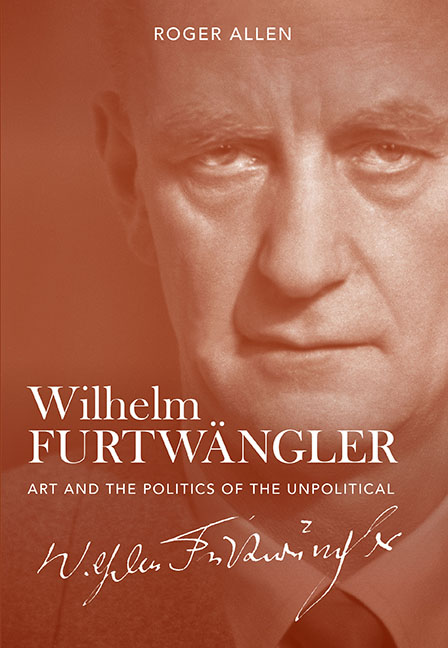Book contents
- Frontmatter
- Dedication
- Contents
- List of Illustrations
- List of Abbreviations
- Prelude
- Acknowledgements
- Preface
- Note on Translations
- Chronology
- Introduction
- 1 Wilhelm Furtwängler: The Historical, Cultural and Intellectual Background
- 2 Childhood and Youth (1886–1911)
- 3 Lübeck and Mannheim (1911–20)
- 4 Furtwängler in the Weimar Republic (1919–33)
- 5 Furtwängler and the Nazi State I (1933–35)
- 6 Furtwängler and the Nazi State II (1935–45)
- 7 Reflection and Reaction: Furtwängler in the Immediate Post-War Period (1945–50)
- 8 Furtwängler as Symphonist
- 9 ‘All Greatness is Simplicity’ (1951–54)
- 10 Afterword
- Appendix 1 Two Furtwängler Essays
- Appendix 2 Thomas Mann, ‘Germany and the Germans’ (1945)
- Appendix 3 Audio and Visual Sources
- Bibliography
- Index
- Frontmatter
- Dedication
- Contents
- List of Illustrations
- List of Abbreviations
- Prelude
- Acknowledgements
- Preface
- Note on Translations
- Chronology
- Introduction
- 1 Wilhelm Furtwängler: The Historical, Cultural and Intellectual Background
- 2 Childhood and Youth (1886–1911)
- 3 Lübeck and Mannheim (1911–20)
- 4 Furtwängler in the Weimar Republic (1919–33)
- 5 Furtwängler and the Nazi State I (1933–35)
- 6 Furtwängler and the Nazi State II (1935–45)
- 7 Reflection and Reaction: Furtwängler in the Immediate Post-War Period (1945–50)
- 8 Furtwängler as Symphonist
- 9 ‘All Greatness is Simplicity’ (1951–54)
- 10 Afterword
- Appendix 1 Two Furtwängler Essays
- Appendix 2 Thomas Mann, ‘Germany and the Germans’ (1945)
- Appendix 3 Audio and Visual Sources
- Bibliography
- Index
Summary
By the time of his death in November 1954 Wilhelm Furtwängler was already an historical figure. Born and raised in the Wilhelmine Empire, he lived through the Weimar Republic and the Third Reich, and then experienced de-Nazification in the very different context of post-war Bundesrepublik restoration overshadowed by the unfolding narrative of the Nazi Holocaust. Yet in spite of these seismic political and ideological upheavals, his world-view remained unchanged and governed by the conservative-nationalist ideologies of Bürgertum. He remained a figure of the nineteenth century. He can only be understood against this background.
As became clear in the previous chapter, Furtwängler effectively historicised himself through the writings, compositions and concert-giving activities of his last years. An historical period and its associated world-view was represented in him and by him. Romantic idealism with its view of music as a transcendent art form; the organic world-view with its assumption of artistic hegemony; the supra-rational form of anti-intellectualism which became such a feature of Nazi ideology – all are combined to a greater or lesser degree in this complex and highly problematic individual. In as far as he can be said to adopt any specific asthetic position, it represents a heady mixture of seemingly contradictory positions of Hanslick's formalism and the expressive ideas of Schopenhauer and Wagner beaten out on the anvil of Schenkerian organicism. What emerges most strongly, however, in any attempt to follow the development of Furtwängler's thought, is that there is a palpable sense in which, with the qualified exception of a modification of his attitude towards Wagner's work, his core ideas were firmly established by his late twenties and did not in essence change until his death at the age of sixty-eight.
In many respects Furtwängler's writings and his later compositions can be seen as fragments of a grand Schenkerian process of ‘composing out’ of the conservative intellectual agenda first defined in ‘Timely Reflections of a Musician’ (1915), the purpose of which was to justify and defend this position against the influence of what he regarded as increasing artistic degeneracy.
- Type
- Chapter
- Information
- Wilhelm FurtwänglerArt and the Politics of the Unpolitical, pp. 225 - 229Publisher: Boydell & BrewerPrint publication year: 2018



